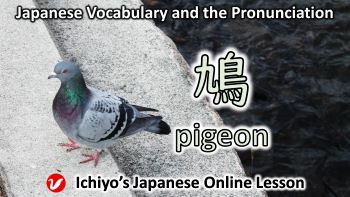The Japanese vocabulary「鳩 (はと、ハト、hato)」means “pigeon.” Please learn the pronunciation and the example sentences.
Japanese Vocabulary and the Meaning
| Key Word | 鳩、ハト |
| Hiragana | はと |
| Romaji Reading | hato |
| English Meaning | pigeon |
The Correct Japanese Pronunciations
Please learn the pronunciation by watching the attached video. You can also learn example sentences.
Our main YouTube channel: Ichiyo’s Japanese YouTube Channel
Our sub-YouTube channel (Japanese vocabulary videos): Ichiyo’s Subchannel
The Example Japanese Sentences
It is important to have skills in both non-honorific and honorific languages in order to use Japanese correctly.
A pigeon flapped and went away.
| Japanese Sentence (Plain Form) | ハトが羽ばたいていった。 |
| Romaji Reading | Hato ga habataite itta. |
| Japanese Sentence (Polite Form) | ハトが羽ばたいていきました。 |
| Romaji Reading | Hato ga habataite ikimashita. |
We plan to fly white doves at our wedding.
| Japanese Sentence (Plain Form) | 結婚式で白い鳩を飛ばす予定だ。 |
| Romaji Reading | Kekkonshiki de shiroi hato o tobasu yotei da. |
| Japanese Sentence (Polite Form) | 結婚式で白い鳩を飛ばす予定です。 |
| Romaji Reading | Kekkonshiki de shiroi hato o tobasu yotei desu. |
A pigeon ran away because it was startled by the footsteps.
| Japanese Sentence (Plain Form) | 足音にビックリして鳩が逃げた。 |
| Romaji Reading | Ashioto ni bikkuri shite hato ga nigeta. |
| Japanese Sentence (Polite Form) | 足音にビックリして鳩が逃げました。 |
| Romaji Reading | Ashioto ni bikkuri shite hato ga nigemashita. |

